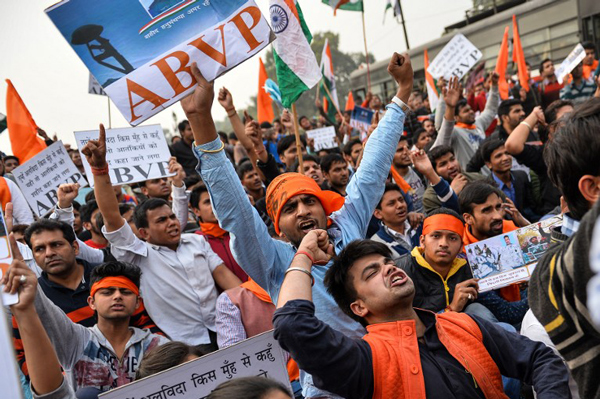#JNUcrackdown: Why campuses have become the new battlefields

Delhi police arrested JNU students' union president Kanhaiya Kumar on Friday and were on the prowl in the campus, raiding student's hostels. Kumar has been charged with sedition.
Acting on the complaint of BJP MP from Delhi Maheish Girri an FIR had been registered against the students for "anti-national" activities. Girri had written a letter to Union Home Minister Rajnath Singh, Minister of Human Resource Development Smriti Irani and the Delhi police commissioner.
It needs to be remembered that even in the recent controversy at the Hyderabad Central University, the HRD ministry pursued this complaint strongly. One of the students who was suspended, Rohith Vemula, committed suicide.
In the JNU case, both Singh and Irani sent out a stern message that no "anti-national activity" would be tolerated on campuses.
Also read: Which part of JNUSU president Kanhaiya Kumar's speech is seditious?
The sequence of events
The event that led to the sedition charges was organised on 9 February. The title of the event was "The Country Without a Post Office'. Around 100 protestors raised their voices against capital punishment in general and what they claimed was the wrongful hanging of Parliament attack convict Afzal Guru.
The event is said to have been organised by former members of a now dissolved students' outfit - Democratic Students' Union (DSU).
This protest has been going on for the past 3 years on 9 February, the date Guru was executed in 2013.
This time around, at the behest of a complaint by the ABVP, the newly appointed Vice-Chancellor withdrew the permission granted to students to organise the event.
The students promised that it would indeed be a peaceful cultural event, with poetry, songs of protest and the like. The permission was withdrawn just 15 minutes before the event.

Photo: Kanhaiya/Facebook
This is when leaders from JNUSU - including arrested JNUSU president Kanhaiya Kumar entered the scene. Kumar exhorted the administration to grant permission to students to hold the event.
However, the event turned into a protest and a few people present shouted anti-India slogans.
They shouted: "Bharat ke tukde tukde kar denge" and "Pakistan zindabad" . According to many of those present, the people chanting these slogans weren't from JNU.
The police have not been able to identify these "outsiders".
The media present there put this on record and what was circulated thereby was the impression that JNU students were rising pro-Pakistan slogans on campus. However, according to most people present there, AISA, AISF, and SFI members refused to be party to this. The official statements of these organisations vehemently condemned the anti-national sloganeering that was resorted to on campus.

Photo: Chandan Khanna/AFP
As the protests progressed, around double the number of ABVP activists gathered. Owing to heated arguments, the situation turned violent and eventually, the police had to be called.
Meanwhile, the issue flared up on primetime television debates. #ShutdownJNU became the leading trending topic on Twitter owing to the extremely well-oiled social media machinery of the BJP and its supporters.
Arnab Goswami, the self-proclaimed messiah of all things nationalistic, pitted the apparent 'anti-national" voices of some unidentified protestors as a dictum against all Leftist students in JNU. To further malign the students, Goswami began drawing completely unnecessary comparisons with the martyred Lance Naik Hanumanthappa.
On Thursday, Girri filed his complaint and the very next day the police arrested Kumar and raided JNU hostels looking for other "suspects".
Hundreds of police personnel were deployed and according to a few eyewitnesses, even paramilitary personnel were present.
The CPI(M) has alleged that male police personnel raided female hostels.
Interestingly there doesn't seem to have been much effort towards identifying who actually raised the anti-India slogans.
Was Kanhaiya Kumar at fault?
The organisers as well as the JNUSU maintain that no student from JNU shouted any such slogans and that these people were outsiders.
Though there is video proof of the anti-India slogans, there is no video of Kumar saying anything of that sort.
In fact in a video that is doing the rounds on social media, Kumar can be heard crticising those who chanted anti-India slogans. The video is of a speech Kumar gave on Thursday. In his 20 minute speech, Kumar is heard speaking on a range of issues - scholarships and hostel accommodation to WiFi connectivity and discrimination against Dalits.
The speech is laced with criticism towards the RSS and BJP in general and HRD Minister Smriti Irani in particular.
But far from being anti-national, he is saying that JNU will never be involved in anti-national activities. Moreover, all leading Left leaning student's groups in JNU have categorically stated that they condemn these irresponsible and malefide statements. So why was Kumar arrested?
Reactions
Speaking to Catch, JKLF chairman Yasin Malik said, "When militancy was at it's peak in Kashmir, I've given speeches in JNU, DU and St Stephen's College. Since militancy in Kashmir was on the rise, the civil society in India encouraged us to adopt non-violent means to protest against the atrocities happening in Kashmir. But, now peaceful and non-violent dissent too is being brutally curbed. Sedition charges are being put on students"
"I pose this question to the entire Indian state and civil society. These students who are expressing their dissent and anger through non-violent means, if you mess with their careers by placing them under dubious sedition charges, are you not pushing them towards violence?" he added.
The Left leadership and civil society slammed Kumar's arrest. Sitaram Yechury called the raids a reminder of the Emergency and eminent faculty and ex-students from JNU issued their unequivocal support against the arrest of Kanhaiya Kumar.
Also read: BJP's Swachh Bharat against 'anti-nationals' should begin at home, not JNU
"As he belongs to the All India Students' Federation, his views and political associations are well-known, and to accuse him of sedition is beyond the bounds of credibility. The only previous occasion when the President of the JNUSU had been arrested was during the Emergency of 1975-77, and the present situation on the campus brings back memories of the Emergency days" read the statement signed by KN Panikkar, CP Bhambri, Anil Bhatti, Utsa Patnaik, Prabhat Patnaik, Zoya Hasan and others.
"Coming in the wake of the dastardly conspiracy of connivance and blatant discrimination that forced Rohit Vemula to take his own life, the storming of the hostels and the arrest of the president of JNUSU are signs of the imposition of an undeclared emergency that need to be opposed, confronted and defeated" read another statement signed by DP Tripathi (Ex-President JNUSU, who was arrested during the emergency) Sohail Hashmi, Anil Chaudhary etc.
A few hours following the JNUSU president's arrest, massive protests broke out in JNU campus.
"Police are doing rounds of the campus and mindlessly witch-hunting activists. They want to target us, like they targeted Rohith Vemula. They want us to hang ourselves like Rohith did. But we want to remind them, every dead Rohith will further intensify the students' movement and people's unity," said JNUSU Vice-President Shehla Rashid Shora told a newspaper.
"We stopped these slogans that called for India's division and destruction. Because we don't believe in politics of division," she added.
Was police action justified?
Every student in a democracy has the right to protest against the government of the day. Isn't dissent the highest form of patriotism? If critical thinking and dissent is curbed in universities, then what will remain of our democracy?
Yes, the chanting of anti-India slogans needs to be condemned. But people do have the right to crtiicise the execution of Afzal Guru and flag human rights abuses in Kashmir. But to brand all people raising the Kashmir issue as anti-national is sheer travesty.
If Subramanian Swamy had the right to organise a seminar on the controversial Ram Janmabhoomi Movement in DU, a small group of students indeed have the right to raise their voices against capital punishment and other issues they deem anti-humanitarian and undemocratic.
Undoubtedly, some of the discourse that ensued at the protest meeting went out of hand. The state first needs to identify the real culprits who raised disturbing slogans about "Bharat ki barbaadi" -- or waging a war till India is broken to pieces -- and then follow due legal process in doling out punishment.
Two things seem clear. One, that the university campus is indeed the new battleground of fleshing out political and ideological wars and two, that the ABVP is out of strike at the "Left-liberal" "anti national" fold with a vengeance.
However, since "nationalistic" passions are easy to arouse, as the debate rages from university campuses and enters living rooms, alarming level of polarisation is taking place within society. The massive outrage over this issue on social media is testament to the fact that the ABVP is winning this ideological war by appropriating the vaguest and most non-critical definition of nationalism and imposing it on everybody else through a well oiled propaganda machinery.
The Left students unions, ever divided, are losing the plot by making hasty and over-the-top statements.
How the Left leadership and civil society react to this will be crucial in determining the future of the turn that Indian society will take. The scale and scope of this ideological war is unprecedented in modern day India. All eyes on our campuses now.
More in Catch:
Einstein proved right! Gravitational waves detected by scientists 'discovery of the century'
#NotesforMrJaitley: How to tackle the subsidy beast without harming the poor
Headley on Ishrat: when a fibbing prosecutor interrogates a shady double agent
Ishrat an 'LeT operative' says Headley, prosecutor Nikam gets flak for 'prompting'







![BJP's Kapil Mishra recreates Shankar Mahadevan’s ‘Breathless’ song to highlight Delhi pollution [WATCH] BJP's Kapil Mishra recreates Shankar Mahadevan’s ‘Breathless’ song to highlight Delhi pollution [WATCH]](https://images.catchnews.com/upload/2022/11/03/kapil-mishra_240884_300x172.png)

![Anupam Kher shares pictures of his toned body on 67th birthday [MUST SEE] Anupam Kher shares pictures of his toned body on 67th birthday [MUST SEE]](https://images.catchnews.com/upload/2022/03/07/Anupam_kher_231145_300x172.jpg)






